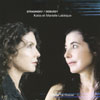Stravinsky; Debussy Works for Two Pianos
The sisters are sensational but the flashy imagery is not for repeating
View record and artist detailsRecord and Artist Details
Composer or Director: Igor Stravinsky, Claude Debussy
Genre:
Chamber
Label: KML Recordings
Magazine Review Date: 11/2007
Media Format: CD or Download
Media Runtime: 58
Mastering:
Stereo
DDD
Catalogue Number: KML112/3

Tracks:
| Composition | Artist Credit |
|---|---|
| Concerto for Two Pianos |
Igor Stravinsky, Composer
Igor Stravinsky, Composer Katia Labèque, Piano Marielle Labèque, Piano |
| En blanc et noir |
Claude Debussy, Composer
Claude Debussy, Composer Katia Labèque, Piano Marielle Labèque, Piano |
| (5) Easy Pieces |
Igor Stravinsky, Composer
Igor Stravinsky, Composer Katia Labèque, Piano Marielle Labèque, Piano |
| (3) Easy Pieces |
Igor Stravinsky, Composer
Igor Stravinsky, Composer Katia Labèque, Piano Marielle Labèque, Piano |
| Ragtime |
Igor Stravinsky, Composer
Igor Stravinsky, Composer Marielle Labèque, Piano |
| (Les) Cinq doigts, Movement: Larghetto |
Igor Stravinsky, Composer
Igor Stravinsky, Composer Katia Labèque, Piano |
| (Les) Cinq doigts, Movement: Moderato |
Igor Stravinsky, Composer
Igor Stravinsky, Composer Katia Labèque, Piano |
| (Les) Cinq doigts, Movement: Lento |
Igor Stravinsky, Composer
Igor Stravinsky, Composer Katia Labèque, Piano |
| Valse des fleurs |
Igor Stravinsky, Composer
Igor Stravinsky, Composer Katia Labèque, Piano Marielle Labèque, Piano |
| Tango |
Igor Stravinsky, Composer
Igor Stravinsky, Composer Katia Labèque, Piano Marielle Labèque, Piano |
Author: Ivan March
This combination of CD and DVD is surely the shape of things to come. Let me first say that (on CD or DVD) the performances of these key Stravinsky works are outstanding in every way, bringing out all the originality, wit and character of the unique keyboard writing, to say nothing of its moments of audacity. The performance of Debussy’s En blanc et noir makes a contrasting centrepiece of equal distinction, dazzlingly colouristic.
However, the accompanying video is another matter. Highly imaginative as it is, not all listeners (including me) will want to persevere with it while listening, even though the movements of flashing, changing imagery are closely and rhythmically coordinated with the music.
In the Concerto (and elsewhere) director Tal Rosner favours images seen from a speeding train (pylons, houses, bridges, the sky, even the rails) to create a “kaleidoscopic architecture of visions”. Then, for some unexplained reason (during the Variations), we have the appearance of a single man, moving about and curiously associated with building blocks.
In the Debussy Rosner finally shows the performers, and here the imagery is often rather telling, with good use made of black and white. They appear again in the final Tango (this episode subtitled “Behind the Scenes”), though perversely not always synchronised playing the music we hear. But the most telling imagery is seen during the so attractive Easy Pieces, where the kaleidoscopic effects are at their most brilliant.
A CD to recommend unreservedly, in vividly present sound, but a more controversial DVD. Incidentally, the cueing printed on the back of the disc applies to the CD only; with the DVD one has to keep returning to the menu to move about.
However, the accompanying video is another matter. Highly imaginative as it is, not all listeners (including me) will want to persevere with it while listening, even though the movements of flashing, changing imagery are closely and rhythmically coordinated with the music.
In the Concerto (and elsewhere) director Tal Rosner favours images seen from a speeding train (pylons, houses, bridges, the sky, even the rails) to create a “kaleidoscopic architecture of visions”. Then, for some unexplained reason (during the Variations), we have the appearance of a single man, moving about and curiously associated with building blocks.
In the Debussy Rosner finally shows the performers, and here the imagery is often rather telling, with good use made of black and white. They appear again in the final Tango (this episode subtitled “Behind the Scenes”), though perversely not always synchronised playing the music we hear. But the most telling imagery is seen during the so attractive Easy Pieces, where the kaleidoscopic effects are at their most brilliant.
A CD to recommend unreservedly, in vividly present sound, but a more controversial DVD. Incidentally, the cueing printed on the back of the disc applies to the CD only; with the DVD one has to keep returning to the menu to move about.
Discover the world's largest classical music catalogue with Presto Music.

Gramophone Digital Club
- Digital Edition
- Digital Archive
- Reviews Database
- Full website access
From £8.75 / month
Subscribe
Gramophone Full Club
- Print Edition
- Digital Edition
- Digital Archive
- Reviews Database
- Full website access
From £11.00 / month
Subscribe
If you are a library, university or other organisation that would be interested in an institutional subscription to Gramophone please click here for further information.




